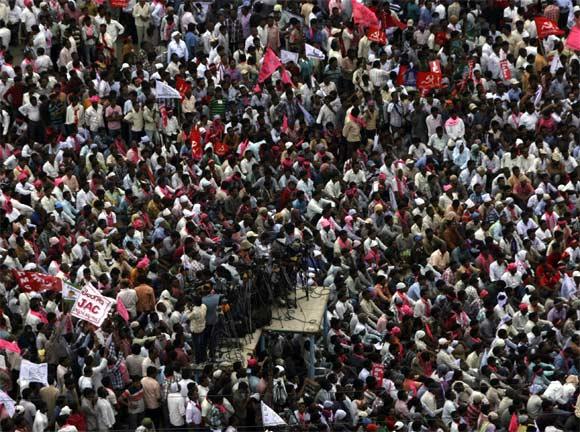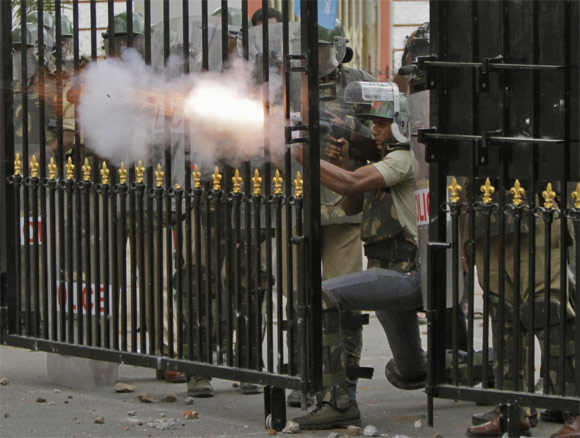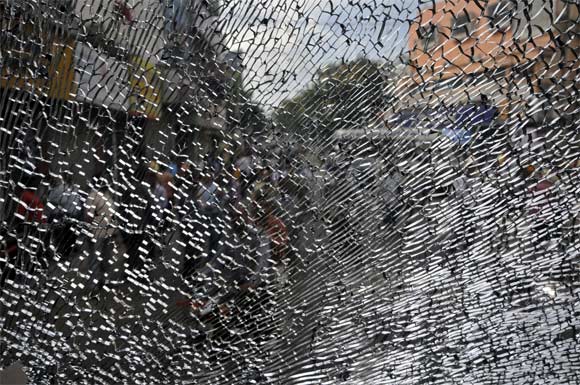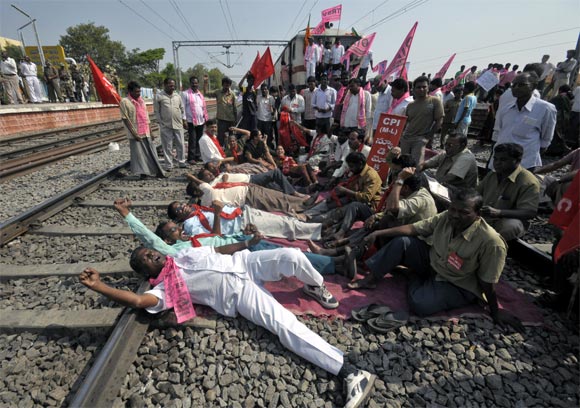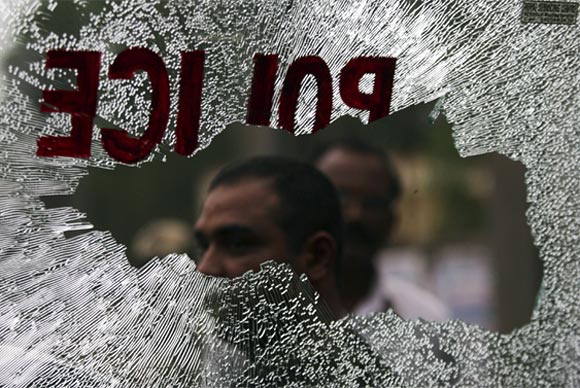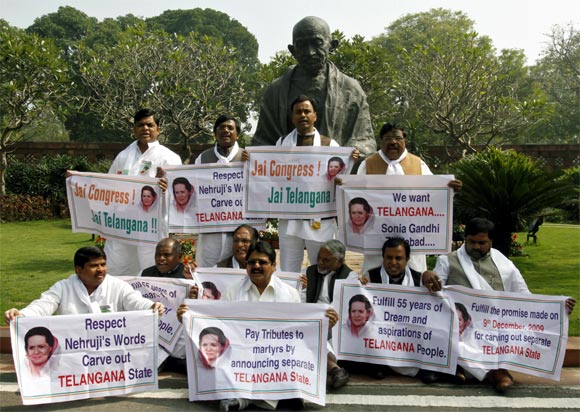 | « Back to article | Print this article |
'Andhra Pradesh should not be divided'
The Union government will soon take a final decision on the demand to create a separate state of Telangana by bifurcating Andhra Pradesh.
101 Lies and Dubious Arguments of Telangana Seperatists, a book written by the Visalandhra Mahasabha, an organisation that opposes the division of the state, examines the claims, assertions, and allegations made by pro-Telangana separatists.
Dr Parakala Prabhakar, general secretary of the Visalandhra Mahasabha, In an interview with rediff.com's Vicky Nanjappa, says that if Telangana activists deliberately distorted the facts to advance their partisan agenda, the book will call their bluff.
What are your thoughts on the possibility of the Union government agreeing to the creation of Telangana?
I don't think the Union government is thinking of dividing Andhra Pradesh. Our republic's essential architecture is the concept of a linguistic state. From Bengal in the east, down along the coast of Bay of Bengal, along the coast of the Arabian Sea up to Gujarat, our country is made of states organised on the basis of language. All non-Hindi speaking regions were organised into states on the basis of language.
There is no reason or need for doing away with that kind of an arrangement. When new states were formed after the States Reorganisation Commission -- Gujarat, Himachal Pradesh and Haryana were formed on the basis of language. The recent division of Madhya Pradesh and the formation of Chhattisgarh was also done on the basis of language.
In any case, MP was not a linguistic state in the same way as Kerala, Tamil Nadu, Karnataka, West Bengal, Maharashtra, Gujarat or Andhra Pradesh was. So MP's division or UP's division was not the dismemberment of a linguistic state.
This principle of linguistic state was very emphatically reiterated by late prime minister Indira Gandhi in Parliament during a debate on the Jai Andhra agitation in 1972. If the Union government has to depart from that well thought-out principle, it needs to arrive at an alternative principle to reorganise India. I don't see that kind of thinking in the Union government. Nor do I see a need to rethink about this principle. There is no need to revisit that principle.
Do you think Telangana will be formed?
Andhra Pradesh need not be divided. It should not be divided. There is no reason why the state should be divided.
Click on NEXT for more...
'Separatist leaders are playing a clever trick'
In your book, you say that political commentators, parties and also the media have not understood the issue. You say this is due to tireless propaganda. Are the Telangana activists lying about their problems?
Telangana has problems, like every other region in the country. Telangana doesn't have fewer or more problems than any other region in Andhra Pradesh or any other region in the country. Telangana is neither more backward nor less prosperous than any other region in the state or in the country, by and large.
The separatists are trying to show that the problems that the people of Telangana are facing crop up because the region is neglected or exploited. That is not true. For instance, if unemployment is not an issue in the rest of the state and it is found only in Telangana, then you can argue that this is because of negligence. But that is not the case. Similarly, if malnutrition is not a problem in the rest of the state and it is only found in Telangana, you can argue that there is something wrong and the government's policy is unfair.
The separatist leaders are playing a clever trick. They cite a problem and try to say that division of the state is the solution. They then stretch it a bit and say that the reason for the problem is an united Andhra Pradesh. You can see how absurd that argument is. This is simply a trick.
I will give you an example. They say that Flurosis (a dental problem) is common among the people of Nalgonda. That is a fact but after that comes the trick. They say that the rulers of Andhra have neglected Telangana and that is why the people suffer from Flurosis.
You must note two things here. Flurosis in the region was first detected in the 1930s. And Flurosis is as severe in Prakasam and Nellore districts in coastal Andhra and Anantapur in Rayalaseema regions as it is in Nalgonda. There is no causal relationship between the existence of Flurosis in Nalgonda and the formation of Andhra Pradesh in 1956.
I would have granted some weight to the allegation if the occurrence of Flurosis in Nalgonda was a post-1956 phenomenon. They could have said, 'look we never had Flurosis before the formation of the state'. But we have found Flurosis in all the three regions. It is more of a governance problem. It is not a problem of discrimination or neglect of one region.
The problem exists, but it exists in any part of the state or any part of the country. The separatists are using the problems to stoke regional hatred.
Click on NEXT for more...
'Aren't claims of separatists blatant lies'
You say that the claims about Telangana being a neglected region are untrue. Why do you think so?
Please look at the economic data. Since 1956, when the state was formed, the Telangana region has registered enormous growth across all sectors. Take the case of irrigation. Since 1956, over 15 lakh hectares have been brought under irrigation. While this figure is 10 lakh hectares for coastal Andhra, it is only some 2 lakh hectares for Rayalaseema. In percentage terms, coastal Andhra registered 57 per cent growth in irrigation and Rayalaseema witnessed a 44 per cent growth. But Telangana had seen a growth of 191 per cent in irrigation.
Data on education tells you a similar story of growth and progress. Prior to 1956, 12 per cent of the population in coastal Andhra was part enrolled in schools, whereas it was only six per cent in Telangana.
By 2010, the scene had changed dramatically. Today, while 15 percent of the population in coastal Andhra is enrolled in schools, it is 21 per cent in Telangana. Literacy rate in Telangana region has witnessed a spectacular growth of 457 per cent since the formation of Andhra Pradesh.
Let us look at the data on agriculture. In 1956, the area under paddy cultivation in Telangana was nearly 19 lakh acres. After 55 years, that number is over 36 lakh acres -- that is a growth rate of 80 per cent. As a result of the increase in the area under paddy cultivation, rice production went up from nearly 5 lakh tonnes in 1956 to over 44 lakh tones – a growth of nearly 700 per cent.
The growth in numbers in other areas of agriculture production is equally dramatic. Maize production went up by over 75 per cent in the last 50 years, pulse production went up by over 200 per cent, cotton production by over 500 per cent and sugar cane production by over 200 per cent.
Don't you find the claims of separatists -- that Telangana is neglected and backward -- are untrue? Aren't they blatant lies?
Click on NEXT for more...
'Telugu people have lived together for nearly 2,300 years'
You have accused the separatists of propagating a lie skillfully. You have also identified 101 false claims by Telangana activists. How do you plan on defending your claims especially when there is such mass support for the cause?
Our book will expose the false claims, lies, distortions, half-truths, misinterpretations and specious arguments by the separatists.
In fact, that there is a mass support for the creation of Telangana one of the biggest lies. We expose it with the help of an analysis of electoral outcomes since 1972.
I must grant one thing. The separatist leaders are very skilful. With their relentless propaganda and demagoguery, they have incited people of the region. They were able to inject some poison in the minds of the people. They are good at hate speeches.
But this is nothing new. It has happened earlier in all the three regions. But the hate, emotion or the so-called separatist sentiment are very short-lived. Before this present spurt of the agitation, we had seen an agitation in coastal Andhra and Rayalaseema regions.
The agitation collapsed in 1972.
The state didn't witness any agitation for 30 long years. Everything was absolutely peaceful until a bunch of politically unemployed people started stoking the flames of hatred.
Even today, I can tell you that the desire for division in all the three regions is very little. Don't get carried away by the shrillness and loudness of their voices.
A large majority of the people want an united Andhra.
Let me give you an example of how the forces of unity remain quiet when the divisive forces create trouble. Recall what happened in Punjab. When the agitation was at its peak, when it was very violent, it seemed as if every man, woman and child in Punjab was in favour of secession. That's because the majority of the people in the state – who wanted an united Punjab -- were not allowed to speak. Could you have concluded that there were no voices of unity then in the state? That the separatist sentiment is overwhelming?
Separatists always have shrillness and loudness on their side. It misleads you.
I want to tell you if you have a sound argument for division, you don't need to whip up passions or indulge in hate speeches. In our democracy, one can put forward sound arguments and convince the people and the government.
What are your arguments for keeping Andhra united?
They are not my arguments. The overwhelming majority of Telugu people want to stay in a united Andhra Pradesh. A small minority in different parts of the state might want Andhra Pradesh to be divided.
The movement for unity began in the 1930s. It started in what is now called Telangana because the then Nizam of Hyderabad smothered the flowering of the Telugu language and culture. He forcibly imposed Urdu on his subjects.
Telugu people have lived together for nearly 2,300 years of the 2,500 years of known history. Only for about 150 to 180 years have they lived under separate political dispensations. That is mainly because the Nizam ceded some territories to the French and then to the British in lieu of his dues to them for maintaining his security forces or under other obligations.
The strong desire for unity among the Telugu people and their leaders in different regions led to the formation of Andhra Pradesh in 1956. In fact, it was the yearning of the Telugu people that gave shape to the idea of linguistic organisation of states. It is this idea that has become the essential defining principle of the architecture of Indian Republic.
So when people are united, it is those who want to destroy that unity who need to show why the unity needs to be destroyed. It is like you asking me why I think India should stay united. What are my reasons? If you want India to be divided, you should tell me why India should not stay united.
Click on NEXT for more...
'The agitation for Telangana is not strong'
If there are so many false claims that are made in favour of the creation of Telengana, why is the movement still so strong?
The agitation is not exactly strong. It is loud, undoubtedly. Our book deals with this impression very elaborately.
The last agitation for the division of Andhra took place was in 1972, in the coastal and Rayalaseema regions. It unsettled the government. President's rule had to be imposed. Between 1972 and 2002, for 30 long years, there was no demand for separation by any region.
Some people tried to stoke the separatist feeling but it did not work. Indra Reddy floated a party and went around Telangana region, but drew a blank. Then Devender Goud resigned from the Telugu Desam Party and floated his party to work for a separate Telangana.
But his part could not draw any support. He joined Chiranjeevi's party and eventually returned to the TDP.
In 2002, K Chandrasekhar Rao floated the Telangana Rashtra Samiti, which did badly in the local elections. In 2004, he teamed up with the Congress and contested 54 seats, but the alliance could only win 26 seats.
Please note, TRS candidates won only when they were in straight contest with the TDP. There was strong anti-incumbency against the TDP. TRS lost in all the seats where it was contesting against the Communist Party of India or the Communist Party of India-Marxist or even a Congress rebel.
In 2008, TRS members resigned from 16 assembly seats to press for their demand for a separate state. In the by-elections, they could retain only seven seats with difficulty. They won less than half of the seats they had resigned from.
In 2009, TRS allied with the TDP. They contested over 40 seats and could win only 10 assembly seats. Its founder-president scraped through with a margin of 15,000 votes in the Mahbubnagar Lok Sabha constituency. It was only a technical win. He won by the skin of his teeth, so to speak. His son won his assembly seat by a meagre margin of 150 – yes, only 150 votes -- in 2009.
It is only in a few by-elections -- which took place in the times of roused emotions after a thoughtless statement by Union Home Minister P Chidambaram on December 9, 2009 -- that the TRS or separatist political forces could win some elections.
But again, look at the 2012 by-election to the Parakala assembly seat. TRS won the seat only by a narrow margin of 1,500 votes.
Now look at the non-electoral scene. There are several rag tag Joint Action Committees. Their mobilisation on the streets is very unconvincing. They term their march a 'Million March' but hardly 10,000 to 15,000 people turned up. Their bandh calls for 24 hours are enforced only for a few hours. After lunch time, it is business as usual in every town. They call for a general strike. They won't allow buses to leave the depots. Interestingly, they can't enforce a bandh call on wine shops and cinema theatres!
The latest show of strength – at Necklace Road in Hyderabad -- was a pathetic one. Hardly 20,000 people attended it. The organisers announced that they won't leave the venue until the Union government declared its decision to form a separate state. But when they saw the low turnout, they had to beat a hasty retreat.
Electorally, their performance is very unconvincing. The civil protests were also very weak. There are some organised forces in this agitation. They are small in terms of numbers but are good in indulging in violent activities – like the demolition of the statues of Telugu luminaries on the Tank Bund of Hyderabad.
People like you mistake this violence and loudness for strength. The agitation is not strong as you think it is.
Click on NEXT for more...
'The division of the state will harm every single Telugu person'
What will be the political outcome if a separate state of Telangana is created? Which party will gain and which party will lose?
I do not see this process as one beneficial to certain political parties and harmful to others. I don't look at issues or their resolution in terms of their being beneficial or harmful to particular political parties.
The division of the state will harm every single Telugu person and it will harm India in the long run. It conveys the message that there are no laid down norms for the political organisation of our Republic, that we have no policy or principles while creating our states. A bunch of violent and skilful politicians and demagogues and groups which organise protests, burn buses, stop trains and go on fake fasts can divide a state.
There should be some framework for forming a state. If the division of Andhra Pradesh takes place, it means that the government of India can be misled, blackmailed, and terrorised to concede to unjustified demands.
Will similar agitations break out in Andhra and Rayalseema if a separate Telangana is created?
Demanding separate statehood is not a new thing for certain groups in all the three regions of Andhra Pradesh.
In 1969, 13 years after the state was formed, an agitation broke out in Telangana to divide the state but it collapsed. And in 1972 another agitation broke out in coastal Andhra and Rayalaseema. That movement also collapsed.
This vindicates our point that there are forces that favour division in all the three regions and there are forces that seek unity in all the three regions. Sometimes, forces that favour division rear their heads in one region and some times they do so in another region.
But the point is, whenever a clash took place between forces of unity and division, the forces of unity prevailed. That is what happened in 1956, 1969 and 1972. We believe that will happen again.
The forces of unity in all the three regions are very strong. The forces of division have no strength in their argument. They actually go against the overwhelming desire for unity among Telugu people.
Click on NEXT for more...
'Union govt will become a laughing stock'
Is statehood a last-ditch attempt by the Union government to save face in Andhra?
If Andhra Pradesh is divided, the Union government will become a laughing stock. It will become an easy target for any group that can stop trains, burn buses, call for bandhs and go on fake fasts. It will show the Union government in a very poor light.
YSR Congress chief Jagan Mohan Reddy has remained mum on the issue. Will his silence help him win over supporters in the other two regions?
When he was in the Congress, he displayed placards in Lok Sabha in support of an united Andhra Pradesh. After he went to jail, his party has not said anything to suggest that it is in favour of the division of the state.
Before the all-party meeting called by Union Home Minister Sushilkumar Shinde in Delhi on December 28, we met the leaders of all the political parties in the state. We also met YSR Congress president Vijayalakshmi (Jagan's mother). She clearly told our delegation that she is in favour of a united state. She also said that late chief minister YS Rajasekhar Reddy wanted the state to stay united. But her party's public pronouncements are not as categorical as that.
Is Hyderabad being a common capital of two separate states a feasible option?
There is no need to think on those lines. For me, the question doesn't arise.
Click on NEXT for more...
TOP photo features of the week
Click on MORE to see another set of PHOTO features...
